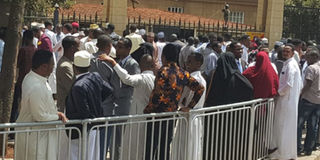Supreme Court set to rule on Wajir governor's election

Supporters of Wajir Governor Mohamed Abdi Mohamud outside the Supreme Court on February 15, 2019 for a ruling on the petition against his election. PHOTO | RICHARD MUNGUTI | NATION MEDIA GROUP
What you need to know:
- The election of the former ambassador was nullified by the High Court last year and the decision upheld by the Court of Appeal.
- The governor convinced the Supreme Court to allow him to prove that he holds a degree in business management and a master’s degree from Kampala University.
Wajir Governor Mohamed Abdi Mohamud will on Friday afternoon know whether the Supreme Court will allow him to complete his term.
The election of the former ambassador was nullified by the High Court in 2018 and the decision upheld by the Court of Appeal.
Arguing the appeal last November, former Governor Ahmed Abdullahi told the court that his rival failed to table evidence that he holds a degree.
Mr Mohamud then moved to the Supreme Court and was allowed to table evidence that he holds a degree as required.
ACADEMICS
Ahmed Muhumed Abdi, who lost the seat to Mr Mohamud, said he failed to provide evidence showing he attended classes at Kampala University or that he graduated as he alleged.
“The court has to tread carefully because you might end up conferring a degree upon somebody who does not qualify,” he told six judges of the Supreme Court through Senior Counsel James Orengo.
Supporting the argument, Senior Counsel Ahmednasir Abdullahi, for Mr Abdullahi, cautioned the court against “elevating the question of a university degree into a constitutional issue”.
He said the Wajir boss was given a chance to rebut claims that he did not possess a university degree but skipped the trial at the High Court.
Mr Omwanza Ombati, supporting Mr Abdullahi, added that eight findings made by the High Court, including irregularities, remained uncontroverted.
DELAY
In reply, Fred Ngatia, for Mr Mohamud, argued that a degree or lack of it could not be used to invalidate an election.
The lawyer also took issue with his rival, saying he did not challenge the matter before the election, only to raise it after losing the seat.
“Why didn’t they raise the issue for five years, only to bring it up after losing the election?”
Mr Ngatia also told the court that the two courts ignored the fact that the requirement for him to strictly prove he holds the two degrees had been waived through a consent signed by parties during the pre-trial conference.
Mr Kamau Karori, for the Independent Electoral and Boundaries Commission (IEBC), said the commission was not required to investigate the certificates brought by the candidates but only ensure they complied with the requirements of the law.
He further said the electoral laws provide mechanisms within which parties can challenge such issues but the same was not challenged.
LONG ROAD
Mr Mohamud moved to the top court after the High Court and appellate court ruled that he was not validly elected because he did not have a degree.
But the governor convinced the Supreme Court to allow him to prove that he holds a degree in business management and a master’s degree from Kampala University.
Chief Justice David Maraga and Justices Mohamed Ibrahim, J.B. Ojwang’, Smokin Wanjala, Njoki Ndung’u and Isaac Lenaola said they will give their judgment on notice.





